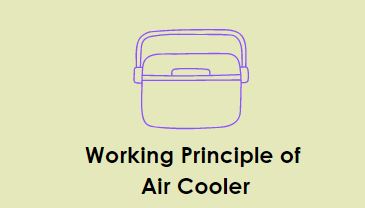Even though the summer heats might be terrible, there are affordable and ecologically friendly solutions to combat it. An illustration of such a gadget is one that cools the air by using the evaporation process. We’ll examine an air cooler’s operation in this post to see how it provides cooling throughout the sweltering summer months.
What is a Air Cooler?
A device called an air cooler uses the evaporation process to chill the air in a room or other confined environment. Swamp coolers, desert coolers, and evaporative coolers are other names for it. Air coolers don’t utilise compressors or refrigerants to chill the air like air conditioners do. Instead, they rely on evaporation to cooler the air naturally, which make them a more energy-saving and environmentally beneficial option.
Components of an Air Cooler
Let’s take a deeper look at an air cooler’s main parts in order to comprehend how it functions,
- Water reservoir: Stores water that is used for cooling.
- Pump: Circulates water from the reservoir to the cooling pads.
- Cooling pads: These cellulose-based pads are in charge of absorbing moisture and promoting evaporation.
- Fan: Draws in hot air from outside and forces it through the cooling pads, creating a cool breeze.
Working Principle of a Air Cooler
The working principle of an air cooler revolves around the evaporation of water. When hot air is drawn into the cooler, it passes through the wet cooling pads. The water present on these pads evaporates, absorbing heat from the air in the process. The cooled air is then blown out by the fan, creating a refreshing breeze in the room.
Evaporative Cooling Process
Evaporative cooling is the primary process behind an air cooler’s functionality. Water absorbs heat from its surroundings as it turns from a liquid to a gas during evaporation. This property allows air coolers to quickly and efficiently cool the air without consuming much energy.
The Role of Cooling Pads
The evaporation process depends heavily on the cooling pads in an air cooler. These pads are made of cellulose materials, have a sizable surface area, and are intended to store a sizable volume of water. The water on the surface of the wet pads evaporates when the hot air passes past them, cooling it.
The Fan’s Role
The fan in an air cooler is responsible for drawing in hot air from outside and pushing it through the cooling pads. As the air passes through the wet pads, it undergoes a cooling process, removing heat from it. The fan then expels the cooled air back into the room, providing relief from the heat.
Benefits of Using an Air Cooler
Air coolers offer several advantages that make them a popular choice among homeowners. Some of the key benefits include:
Energy Efficiency
Compared to air conditioners, air coolers consume significantly less energy. The absence of compressors and refrigerants makes them more eco-friendly and cost-effective to operate.
Fresh and Natural Cooling
Air coolers provide fresh and natural cooling by constantly circulating fresh air through a process of evaporation. They do not recirculate the same air, unlike air conditioners, which can lead to stale indoor air.
Health Benefits
Air coolers intake outside air, which gets filtered as it passes through the wet cooling pads. This filtering method improves indoor air quality and benefits those with respiratory conditions by removing dust and allergens from the air.
Eco-Friendly Solution
Air coolers utilize water as the primary cooling agent, making them an environmentally friendly choice. They do not contribute to ozone depletion or emit harmful greenhouse gases.
Cost-Effective Cooling
Air coolers are generally more affordable to purchase and install compared to traditional air conditioning units. They are a long-term cost-effective cooling solution because to their decreased operational and maintenance expenses.
Conclusion
An energy- and environmentally-friendly approach to fight the summer heat is with air coolers. They deliver cold, refreshing air without the unnecessary energy use associated with air conditioners by utilising the force of evaporation. In the sweltering summer months, an air cooler may assist you in creating a comfortable and healthful atmosphere, whether you’re trying to chill a small room or a huge area.

